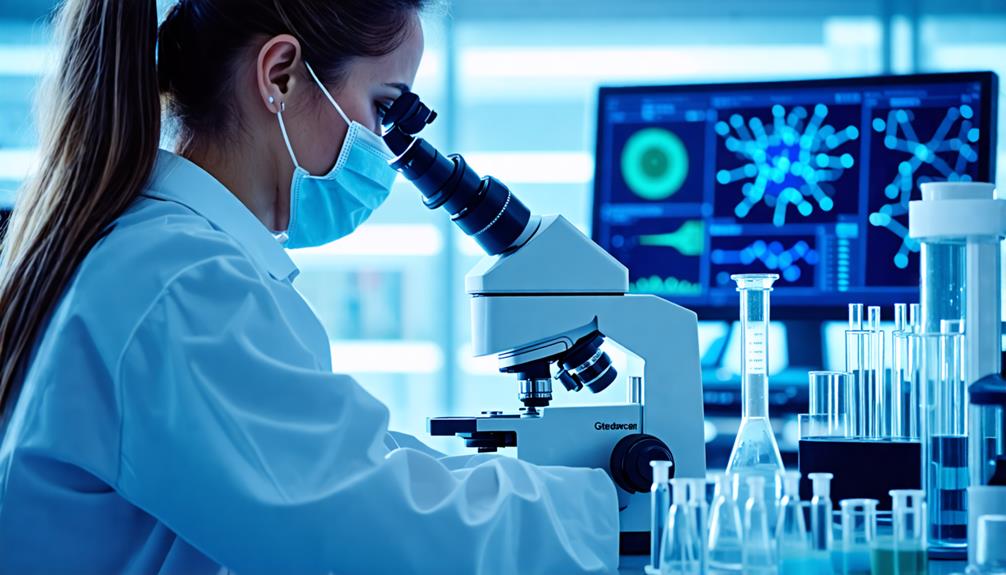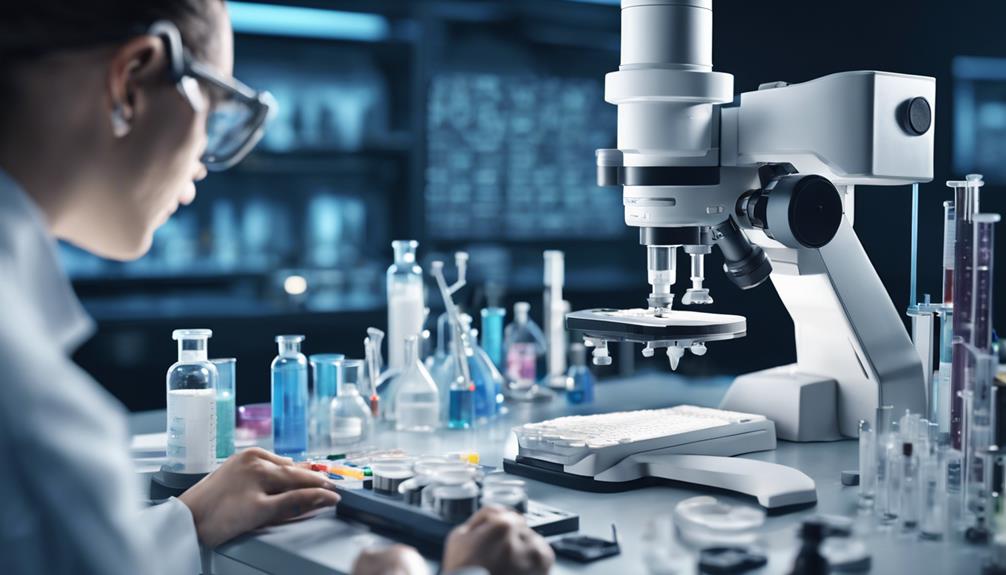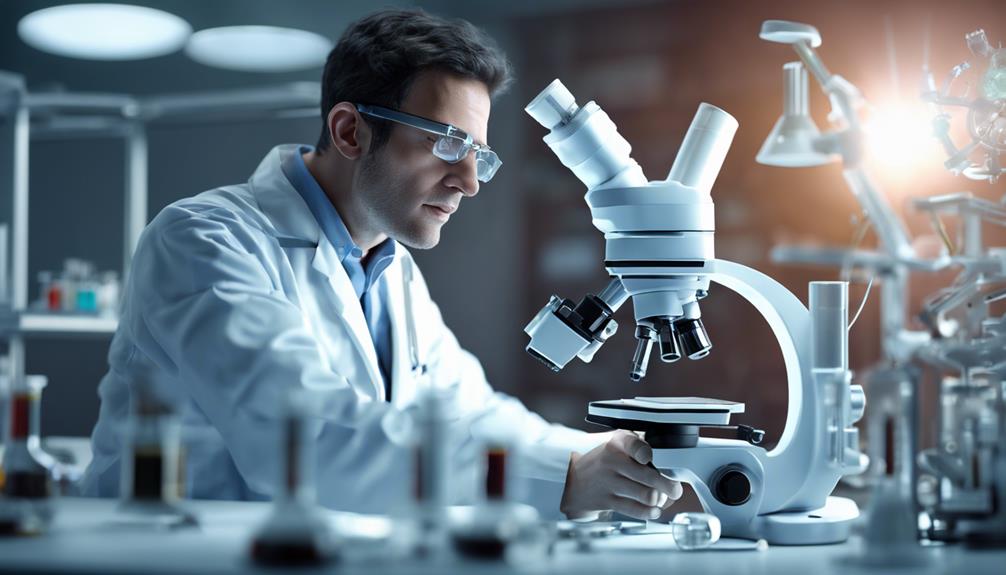
As a medical technologist, you'll handle complex tests that are crucial for diagnosing and treating diseases. You work behind the scenes, analyzing body fluids, tissues, and ensuring the data you provide is precise for doctors to rely on. Your role also includes calibrating laboratory equipment and managing safety standards to uphold a sterile work environment. You'll collaborate closely with other healthcare professionals to assist in crafting effective treatment plans. By mastering this role, you not only contribute to immediate patient care but also pave the way for potential advancements in your career, which you'll find opens many doors in the field.
Role and Duties

Medical technologists play a crucial role in healthcare by conducting complex tests that aid in the diagnosis and treatment of diseases. You're at the forefront of medical science, working behind the scenes to ensure doctors have the accurate data they need. Your day-to-day duties involve analyzing body fluids and tissues, interpreting results, and logging data into medical records. You're not just operating machines; you're ensuring each test is performed correctly and efficiently.
You also play a key part in managing the laboratory. This includes calibrating equipment, preparing reagents, and ensuring all materials are handled according to strict safety standards. You're responsible for quality control, making sure that every result sent out is reliable and precise.
Moreover, you often collaborate with other healthcare professionals to discuss findings and consult on patient care. Your expertise helps guide treatment plans and monitor the effectiveness of interventions. You mightn't interact with patients directly, but your impact on their health is profound.
In essence, you're a vital link in the chain of healthcare services, delivering critical information that shapes medical decisions. Your role demands meticulous attention to detail and a deep understanding of biological processes, making you an unsung hero in the medical field.
Educational Requirements
To become a medical technologist, you'll need specific educational qualifications and certifications. Typically, you must pursue a bachelor's degree in medical technology, clinical laboratory science, or in a life sciences field. These programs provide the foundational knowledge in microbiology, chemistry, hematology, and immunology that you'll rely on daily.
During your degree, you'll also complete clinical rotations, which are crucial for gaining hands-on experience in different laboratory settings. These rotations prepare you for the real-world scenarios you'll encounter and help you understand the workflow and responsibilities of a medical technologist.
After completing your degree, you're not quite done yet. You'll need to obtain certification from a recognized professional body, such as the American Society for Clinical Pathology (ASCP) or the American Medical Technologists (AMT). These certifications aren't just formalities; they're often required by employers and ensure that you meet industry standards.
Some states also require licensure, so you'll need to check the specific regulations in the state where you intend to work. This might include passing a state exam and completing continuing education courses to keep your knowledge up to date and maintain your licensure.
Necessary Skills

Beyond formal education, you'll need a set of specialized skills to excel as a medical technologist. Firstly, your analytical skills must be top-notch. You'll often interpret complex biological data, so the ability to discern subtle differences in test results is crucial. It's not just about understanding what the numbers say; it's about understanding what they mean in the broader context of patient care.
You'll also need strong technical skills. You'll operate advanced laboratory equipment, perform intricate tests, and sometimes troubleshoot or make minor repairs. Being tech-savvy isn't just an advantage; it's essential.
Attention to detail is another critical skill. Inaccuracies can lead to misdiagnoses. You must be meticulous in conducting tests, recording results, and verifying data to ensure accuracy and reliability.
Moreover, your problem-solving skills will be constantly called upon. When tests yield unexpected results or when equipment malfunctions, you'll need to think on your feet and find effective solutions quickly.
Lastly, effective communication is key. You'll explain complex technical information to healthcare providers, and sometimes to patients. Being able to convey critical details clearly and concisely can significantly impact patient outcomes. These skills combined will set you apart in the field of medical technology.
Work Environment
As a medical technologist, you'll typically work in laboratories within hospitals, clinics, or private labs. These environments are often fast-paced and demand precision and efficiency. You'll find yourself surrounded by advanced diagnostic equipment and are expected to maintain a sterile, organized workspace to prevent contamination and ensure accurate results.
Your daily routine can vary, but it generally includes long hours on your feet, conducting tests, and analyzing specimens. The labs operate around the clock, so you might work day, evening, or night shifts, including weekends and holidays, depending on your employer's needs. Flexibility is key in adapting to different schedules and unexpected situations.
Safety is a top priority in your work environment. You're required to handle biological samples and chemicals that could be hazardous, so following strict safety protocols and wearing protective gear, such as gloves, goggles, and lab coats, is essential.
Despite the challenges, the lab is a collaborative setting. You'll interact with physicians, nurses, and other healthcare professionals to discuss test results and patient care. This teamwork is crucial in delivering timely and accurate diagnostic information, which plays a vital role in patient treatment plans.
Career Advancement Opportunities

While honing your skills in a dynamic lab environment, you'll also find various paths to career advancement as a medical technologist. As you gain experience, you can move into more specialized roles such as a lead technologist or a supervisor in specific lab departments like microbiology or hematology. These positions not only offer higher pay but also more responsibilities, including managing a team and overseeing laboratory operations.
You might also consider advancing into lab management or director positions. These roles require you to handle administrative tasks, budgeting, and policy development, pushing you beyond benchwork into the strategic planning side of lab operations. To prepare for these higher-level positions, you'll likely need additional qualifications such as a master's degree in laboratory science or a related field.
Another avenue is transitioning into sales or marketing for laboratory equipment and supplies. This path leverages your technical expertise and understanding of lab needs, allowing you to advise and sell more effectively to medical facilities.
Lastly, pursuing certifications like the Specialist in Blood Bank Technology or a diplomate in laboratory management can significantly boost your credentials and make you a more competitive candidate for advanced roles.
Each step you take can open new doors and profoundly impact your career trajectory in the medical technology field.
Frequently Asked Questions
How Does a Medical Technologist Handle Work-Related Stress?
You'll manage work-related stress by prioritizing tasks, taking breaks, and utilizing support from colleagues. It's also beneficial to practice stress-relief techniques such as mindfulness or deep breathing exercises during your shifts.
What Are Common Ethical Dilemmas Faced by Medical Technologists?
You'll encounter ethical dilemmas like maintaining patient confidentiality, handling diagnostic discrepancies, and addressing unreported errors. Navigating these challenges requires integrity and adherence to professional standards to ensure trustworthy healthcare outcomes.
Can Medical Technologists Specialize in Pediatric Care?
Yes, you can specialize in pediatric care as a medical technologist. This involves tailoring laboratory tests and analyses to meet the specific needs of infants, children, and adolescents.
How Do Medical Technologists Stay Updated With Industry Advancements?
You stay updated through continuing education courses, attending industry conferences, participating in workshops, and subscribing to relevant journals. Networking with peers also provides insights into the latest trends and technological advancements.
What Impact Do Medical Technologists Have on Patient Outcomes?
You directly impact patient outcomes by conducting accurate lab tests that guide diagnoses and treatment plans. Your expertise ensures timely, reliable results, which are crucial for effective medical decision-making and patient care.
Conclusion
As a medical technologist, you'll play a crucial role in healthcare, conducting essential tests that guide diagnoses and treatment. You'll need a robust educational background, usually a bachelor's degree, and sharp analytical skills.
Your work environment will be primarily in labs, potentially with irregular hours. With experience, you can look forward to advancing into more specialized roles or into management.
Embrace the challenges, and you'll find a rewarding career helping to improve patient outcomes.






